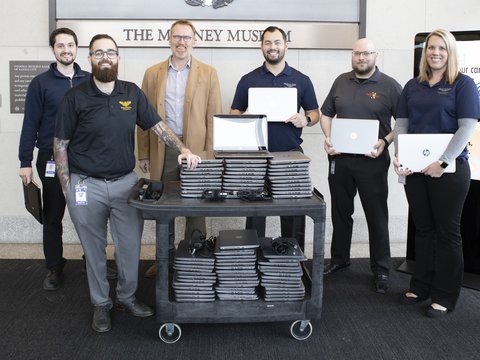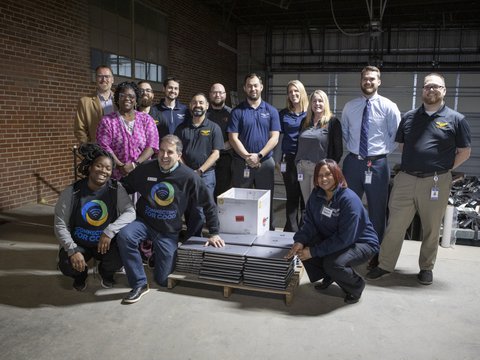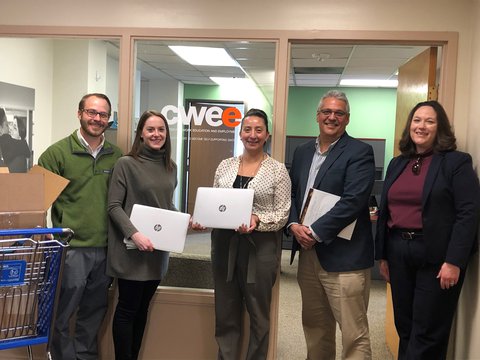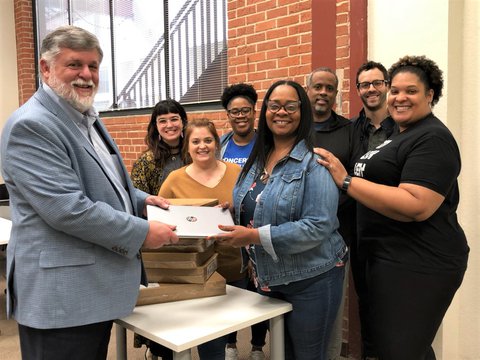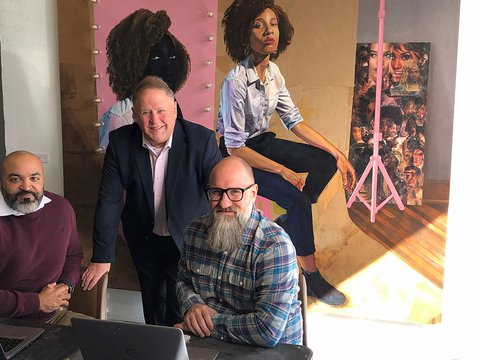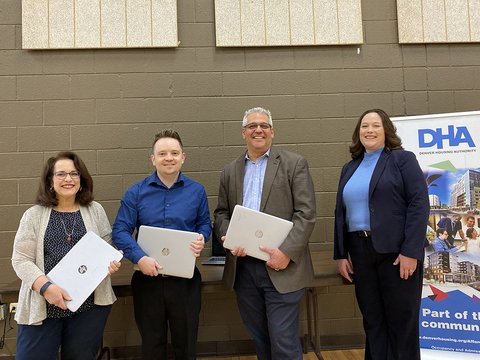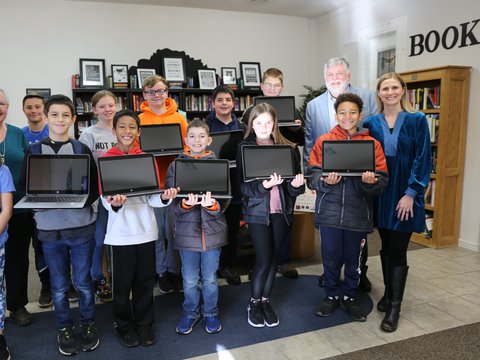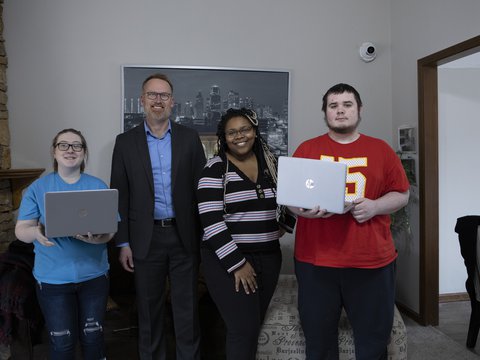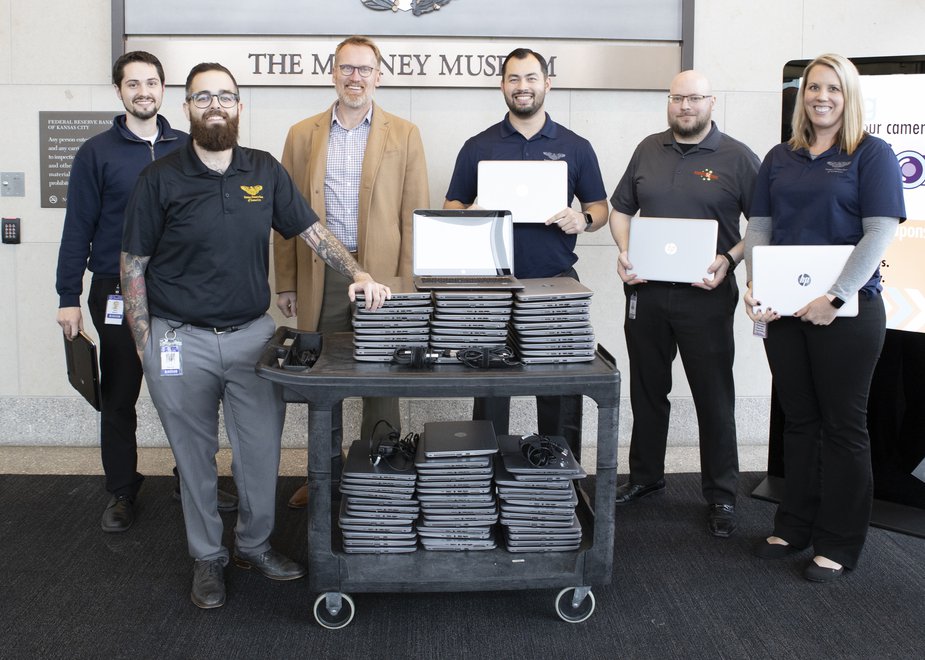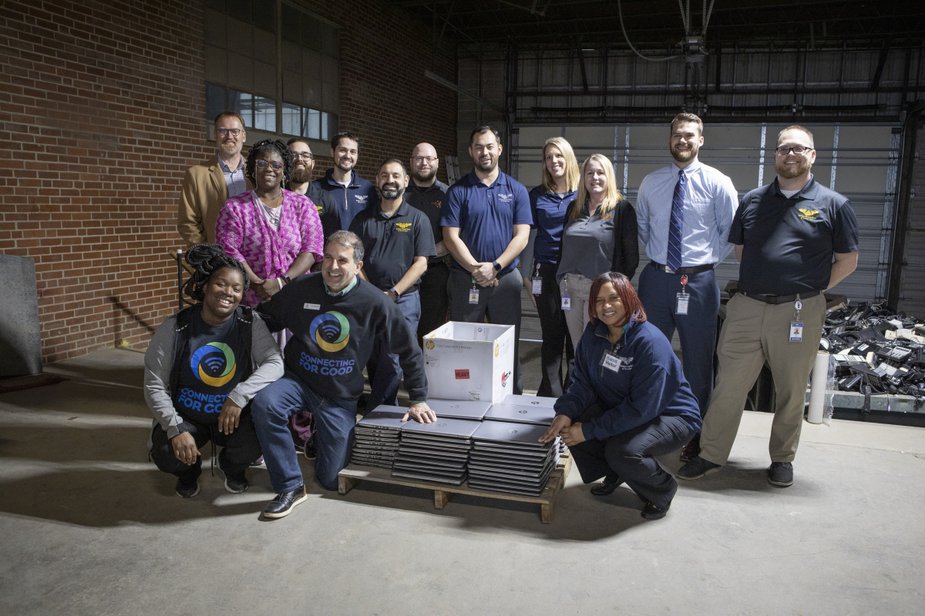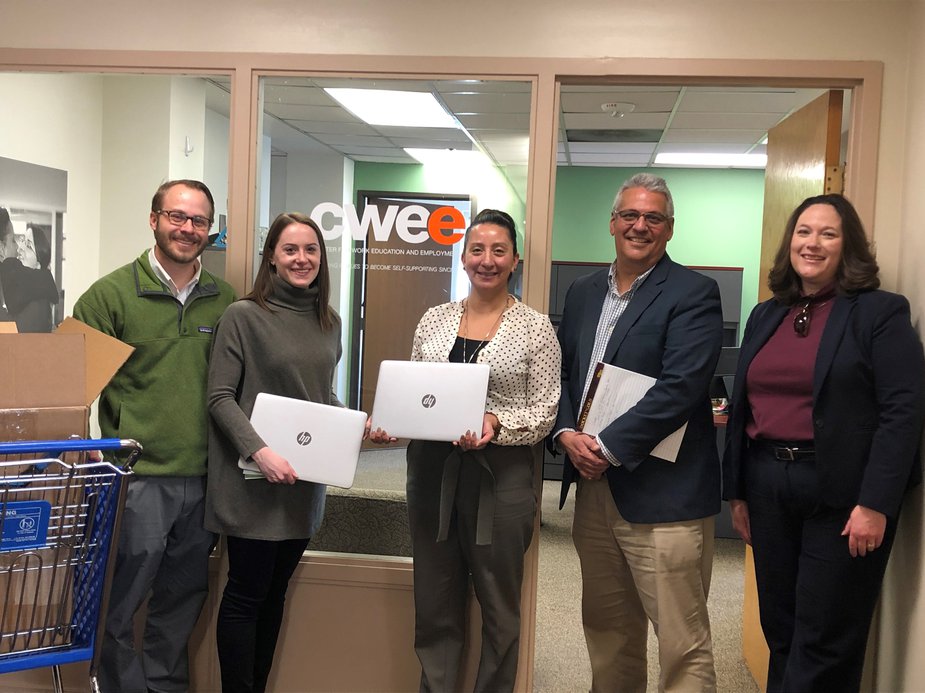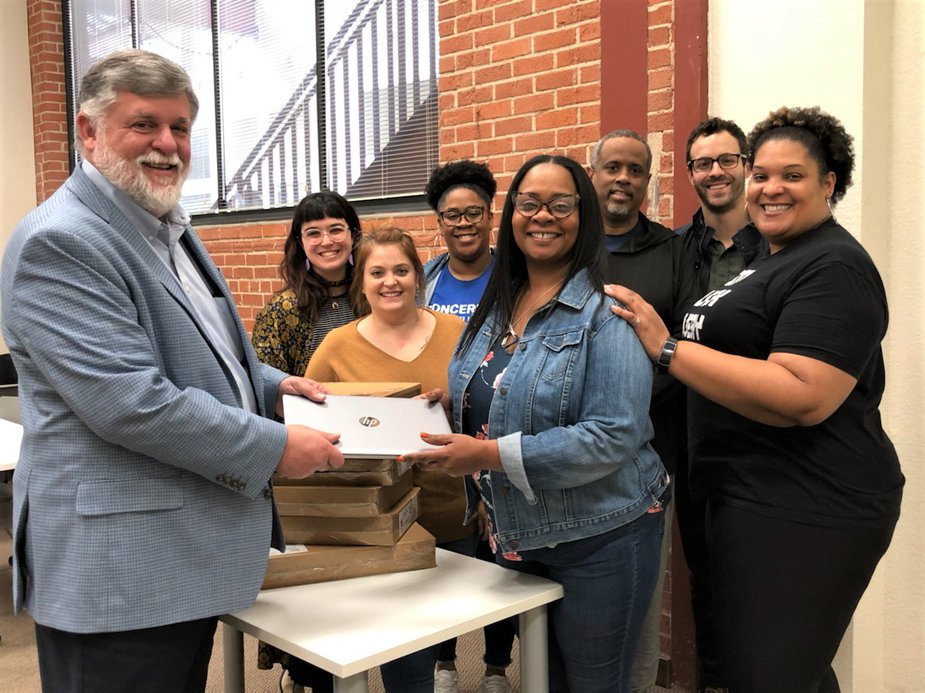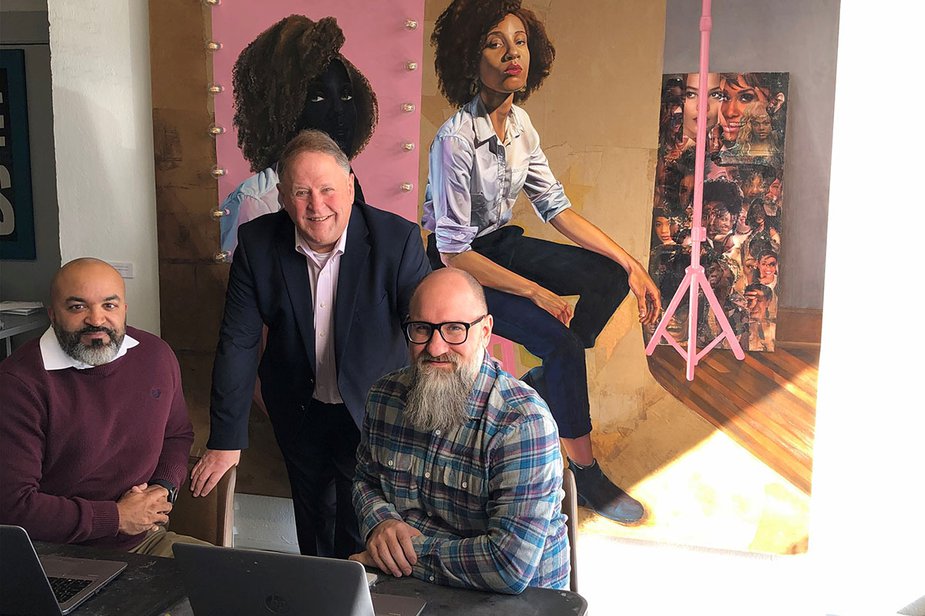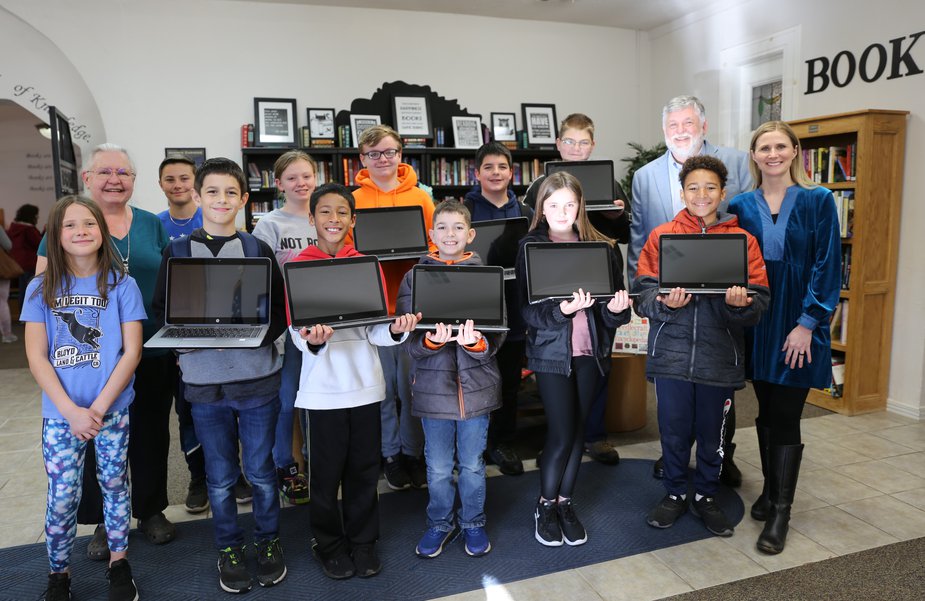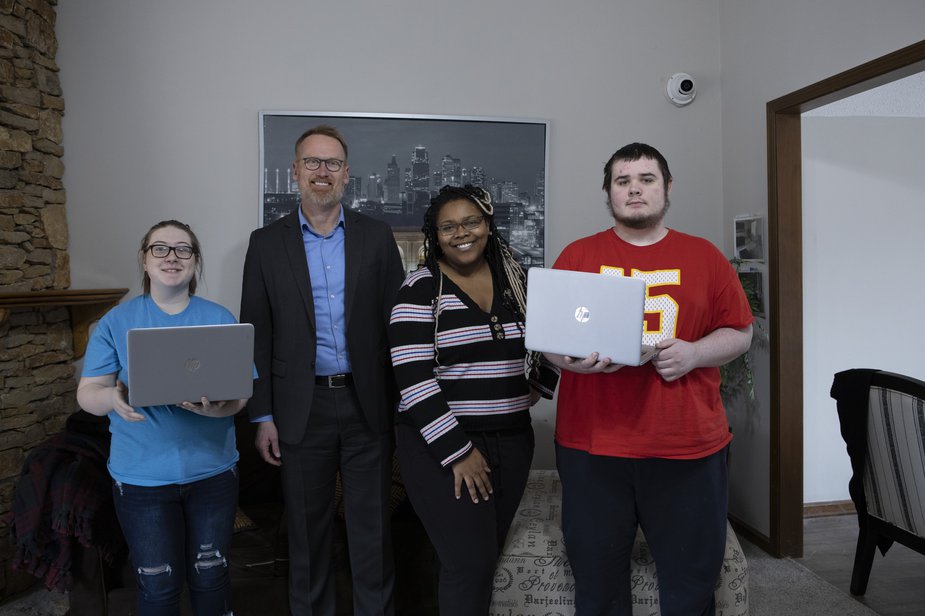Many Americans still struggle to get by without a computer at home. In fact, External Linkrecent data indicate that 41% of lower income American households lack a computer at home. Some rely on cell phones, but anyone who has tried to apply for a job or write a term paper on a cell knows how hard that can be. These Americans are left on the wrong side of what’s referred to as the digital divide.
Employers can be a bridge across the digital divide. Many employers replace their computers (either desktops, laptops or both), often every three-to-five years. What happens to the “old” computers varies from one employer to the next.
Some employers pay third-party vendors to take the computers and erase their data. Others might sell the computers for pennies on the dollar, and some destroy the hard drives and sell or recycle what’s left. None of these scenarios reap a large return, and some cost the employer money.
A better way: Getting used computers to those in need.
In 2018, the Kansas City Fed piloted a project to test the costs and benefits of donating a small number of computers to support community development initiatives. The Bank donated 25 decommissioned laptops to what is now PCs for People—Kansas City, a local nonprofit refurbisher. The goal was to identify what, if any, affect the computers might have in serving those who otherwise wouldn’t have a device.
In just a few short months the Kansas City Fed’s old computers were living their best new lives. Some were allowing single moms to earn their GEDs and attend community college. Others were allowing lower income students to learn how to code and to compete in robotics competitions (learn more about this pilot project on page 56 of Disconnected). All this for a donation of used equipment that otherwise would have reaped the Bank a few hundred dollars total.
With outcomes like this, why don’t all employers donate at least some of their used computers? Oftentimes it’s simply a lack of awareness that it’s possible, or not knowing how to go about doing it.
Challenge generates 7,500+ donated devices
At the outbreak of the COVID-19 pandemic, the Kansas City Fed launched a year-long campaign, called the Employer Laptop Challenge, to encourage other employers to donate used computers. Through outreach, partner engagement and a social media campaign, we asked employers to donate used computers to nonprofit refurbishers, schools, or nonprofits of their choice, and then share news of the donation on social media using the hashtag #LaptopHero.
Between April 2020 and April 2021, employers across the country answered the call with more than 7,500 computers donated.
Learn about the employers who donated, and why they donated.
What are the benefits of donating computers?
Donating your employers’ used computers is a low-cost way you can connect those in need to education, remote healthcare, jobs and economic opportunity.
The following additional benefits draw on lists provided by: EALgreen, PCs for People, and TechSoup.
Financial benefits. According to our sources, a refurbisher that is NAID AAA-certified for data wiping or destruction will virtually eliminate the chance of an expensive data breech. Nonprofit refurbishers will often provide this data wiping service for free.
If you donate your equipment to a nonprofit or a nonprofit recycler or refurbisher, you may also be able to take a tax deduction for the value of the electronics you contribute.
Corporate pride and citizenship. Simply put, doing good can feel great. You can join with other employers to help kids learn, help adults get digital skills training or apply for jobs, or help seniors stay in touch with family. Participating can boost employee engagement. It can also help to create brand loyalty. When you see the difference that your used equipment makes, you and your employees will be proud.
Environmental benefits. Refurbishing computers and accessories is many times more efficient than recycling the same gear. Keep in mind, 75% of the fossil fuels and energy used by computer are consumed during manufacturing. If you reuse, you’ve created a bigger return on that investment.
Each 5-pound laptop took about 20,000 pounds of raw materials to make. Recycling allows the recovery of valuable materials. A refurbisher that has either the e-Stewards or the R2 Responsible Recycling certifications is audited by an independent third party to assure that they reuse or recycle every tidbit in an environmentally responsible way.
How to donate your used computers
How do I donate computers through a nonprofit refurbisher? How do they work?
Donating to a nonprofit computer refurbisher can be the easiest way for an employer to get surplus computers into the hands of those in need. Nonprofit computer refurbishers, such as External LinkCompudopt, External LinkHuman-I-T, External LinkPCs for People, and External LinkTech For Troops, refurbish donated computers and provide them to nonprofits, schools and lower income families at little to no cost. Many of them adhere to the same strict data destruction standards as for-profit refurbishers.
What do I need to know about data destruction?
Data destruction, also known as data erasure, is a software-based method of overwriting the data. It aims to completely destroy all electronic data residing on a hard disk drive or other digital media.
Some computer refurbishers will expect you to destroy the data. Others can do it for you, often at no cost to you. Data destruction processes and standards vary. The following organizations have developed standards and certifications for data destruction and responsible recycling. Each offers a searchable list of certified recyclers and refurbishers.
- External LinkNational Association for Information Destruction (NAID)
- External Linke-Stewards
- External Linki-SIGMA
- External LinkSERI
As with your existing computer disposal process, it is important to ensure all of your data are removed before your computers are given a new life serving others. Be sure you understand how your data will be removed.
If you have found a nonprofit computer refurbisher to accept your donation…
Be sure you understand how your data will be removed from the devices. Some employers remove data “in-house,” before donating, but many nonprofit refurbishers can provide this service at no cost.
If your company isn’t comfortable donating computer hard drives…
While some computer refurbishers adhere to strict data destruction procedures, employers may still be reluctant to donate computers with the hard drives included. That’s okay. While a computer with a hard drive included is most beneficial, many refurbishers can add a hard drive to a donated “shell” that’s in good condition.
If you need help connecting to a nonprofit computer refurbisher…
Contact External LinkDigitunity, a nonprofit organization that supports a national network of nonprofit computer refurbishers. The staff at Digitunity will match you up with a nonprofit refurbisher that meets your needs.
If you want to donate computers directly to a nonprofit or school…
Be sure to check with them first to ensure they have the capacity to install new operating systems and software, and that your computers match up with their needs. Also ensure you understand how your data will be removed ahead of the donation.
Donating to a nonprofit computer refurbisher can be an easier, faster way to get your devices to those in need. In some cases, the refurbisher might be able to direct some or all your donated computers to the school or nonprofit of your choice.
What can I donate?
Desktops, laptops and Wi-Fi hotspots are currently in high demand. Most refurbishers also take accessories, such as keyboards, mice, printers, scanners, monitors and more. There may be a charge for taking some hard-to-recycle equipment, such as monitors.
How do I know if my laptops/IT equipment are too obsolete to be helpful?
Usually, the lifespan of a computer is seven years. According to TechSoup, if your computer is less than five years old, it can probably be put to good use by someone else. If the equipment is not working or is more than five years old, it should be recycled. Computers contain materials that are hazardous to people, animals and the environment. It is important that the recycler safely remove those hazardous materials and save any that can be reused.
Can I donate my used personal equipment?
Potentially, if your equipment is in fairly good shape and less than five years old.
Why is the Kansas City Fed encouraging donations of used devices?
A key component of the Kansas City Fed’s digital inclusion initiative focuses on increasing the number of households with up-to-date computers. Encouraging employers to donate quality, used computers is a quick, low-cost way to accomplish that goal.
Is the Kansas City Fed endorsing participating nonprofits or companies?
No. Our goal is to help as many employers as possible find ways to give their used equipment a second life serving others. The Bank is not screening, vetting, or endorsing computer refubishers or any organization that receives computers because of a donation.
If you would like more information, you can contact us here.
Learn how the Kansas City Fed is bridging the digital divide. See Disconnected: Seven lessons on fixing the digital divide, a layperson’s guide to digital inclusion, and sign up for our e-newsletter. External Linkhttps://www.kansascityfed.org/ealert Questions? Contact Jeremy Hegle.

